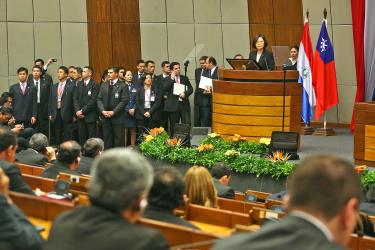The government will continue to look for ways to maintain dialogue with China, President Tsai Ing-wen (蔡英文) said during her state visit to Paraguay on Tuesday, several days after Beijing said that it had halted a regular communication mechanism with Taipei.
“No matter what party is in government in Taiwan, we always have a single, common objective: to maintain peace and stability in the Taiwan Strait,” Tsai told reporters during a visit to Paraguay, the nation’s sole diplomatic ally in South America.
“We will continue the dialogue with mainland China, as even though, probably at this moment official negotiation channels have been temporarily interrupted, there still exist other options for communication and dialogue,” she said, speaking through an interpreter.
Premier Lin Chuan (林全) yesterday said that the government’s hope was for positive interactions with China to continue, based on the existing foundations.
“There must be willingness on both sides to move forward on the relationship,” Lin told reporters when asked about the suspension at a function in southern Taiwan.
However, a spokesman for China’s Taiwan Affairs Office (TAO), An Fengshan (安峰山), signaled that there would be no compromise, saying that the so-called “1992 consensus” had provided the basis for improved cross-strait relations since 2008, when Ma Ying-jeou (馬英九) became president and signed a series of landmark trade and tourism deals with China.
The TAO reiterated that Taiwan should be held completely responsible for the suspension of communication channels.
“People cannot help but ask — why does Taiwan want to change the peaceful development of relations across the Taiwan Strait that has been in place since 2008? What is the aim?” An said at a regular news briefing in Beijing.
An on Saturday last week said that the cross-strait mechanism for contact and communication had been suspended since May 20, as Taipei has not recognized the “1992 consensus.”
The “1992 consensus” refers to a tactic understanding that both sides belong to one China, with each having its own interpretation of what that means.
Former Mainland Affairs Council chairman Su Chi (蘇起) said in 2006 that he made the term up in 2000.
People First Party Chairman James Soong (宋楚瑜) yesterday called on both sides of the Strait to mutually respect each other, since “peace” should be the common ground for both sides.
Since Tsai’s government basically accepts the results of all cross-strait exchanges and negotiations in the past, including the talks in 1992, “the two sides should not break the harmony for just one term,” Soong said.
KMT Vice Chairman Steve Chan (詹啟賢) said that his party has always been clear on its view of the “1992 consensus” and so the TAO’s remarks were not meant for the KMT.
Tsai is on her first trip overseas as president, visiting Panama and Paraguay, with transit stops in the US.
In other developments, a China Airlines flight attendant has been arrested for allegedly saying that there was a bomb on Tsai’s charter flight less than one hour prior to takeoff at the beginning of her state visit on Friday last week.
The 42-year man surnamed Huang (黃) allegedly made a telephone call from a pay phone in New Taipei City’s Sinjhuang District (新莊) to police at about 8am on Friday morning, claiming that there was a bomb on Tsai’s plane.
Police immediately passed the information on to the National Security Bureau and the Aviation Police Bureau, which later confirmed that the call was a hoax.
After checking security cameras in the area, police arrested Huang on Saturday evening.
The Taoyuan Flight Attendants’ Union confirmed that Huang is a member, but said that the act was not related to and was not encouraged by the union.
The airline said that it would immediately launch a probe within the company.
Additional reporting by: Lu Yi-hsuan and staff writer
Source: Taipei Times - 2016/06/30





















